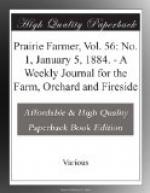Farmers’ Call: Turkeys do not require as warm quarters in winter as do other fowls. They will rest on a cherry tree when the mercury is frozen solid in the thermometer bulb, and then fly down in the morning and wade through the snow to cool off. This is a hint to the turkey raiser. Do not confine the turkeys in quarters too warm and close, and be sure that they have three or four hours’ exercise each day in the open air. The turkey is really a hardy fowl and easily wintered if you do not pet it too much. Be a little unkind to it in cold weather. About all the shelter they will need is a wind-break. Give them plenty of highly nutritious food.
Mr. Harrison Weir writes: “What the farmers should do is this—they should produce their poultry of the finest quality, poultry of the stamp of the old Dorking—plump birds, thick-skinned birds, small-boned birds, and birds with little offal—fat them well, truss them well, and send them to market. The white-legged beauties would take the highest price, and, if well seen to, would very soon drive the foreign fowls from our markets, and English gold would gladden the home of the English henwife. I may mention that a neighboring farmer intends rearing 3,000 chickens next spring, all to be off his ground before the beginning of May, when the cattle will come out. He expects to get 75c. a head, and I believe he will, and it will pay him if he does.”
Poultry houses should be whitewashed inside and out. For the inside we add two tablespoonfuls of carbolic acid or a pound of sulphur to a pailful of the wash (to kill vermin); do not be afraid of putting on too much, but apply the wash to every corner and crevice in the building. If you have plank floors, clean them off nicely and put on three or four inches of fresh earth. Dirt floors should be dug up the depth of one foot. Wash your windows (if you have any in your house, and if not you ought to have them), so that the fowls can see daylight, and in bad weather they will enjoy the confinement of the poultry houses much better. Wash off the roosts with kerosene oil at least once a week. Take every nest box and wash inside and out, and put in clean straw, sprinkling upon it some sulphur or loose tobacco. Observe these rules, and your fowls will do better and keep healthier. We find this good advice floating about and do not know its source. The hints are worth remembering.
* * * * *
THE THROAT.—“Brown’s Bronchial Troches” act directly on the organs of the voice. They have an extraordinary effect in all disorders of the throat.
* * * * *
THE APIARY
[Illustration]




